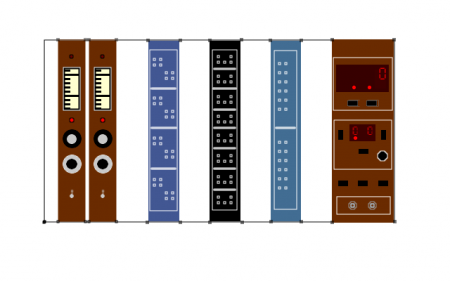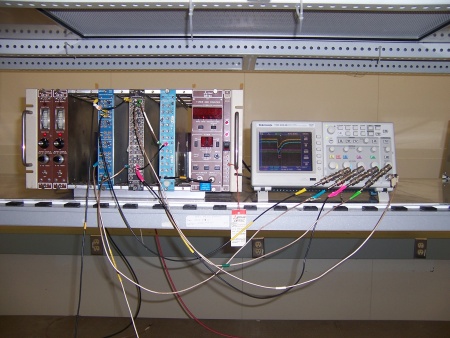Difference between revisions of "Detectors"
(Minor edits and add image) |
(added photo from workshop) |
||
| Line 36: | Line 36: | ||
* Coincidence, LeCroy Research Systems Model 363AL 4-Fold Logic Gate | * Coincidence, LeCroy Research Systems Model 363AL 4-Fold Logic Gate | ||
* Scalar, Ortec Model 871 Timer/Counter | * Scalar, Ortec Model 871 Timer/Counter | ||
| − | [[Image:NIMbinnai.png|thumb| | + | [[Image:NIMbinnai.png|thumb|450px|left | Drawing of NIM Electronics for 11C experiment]] |
| + | [[Image:C11nimbin.jpg|thumb|450px|right| Actual NIM Electronics for 11C experiment with pulses]] | ||
Revision as of 13:10, 8 September 2010
Experiments using Neutron Detectors
Main Reference Site for Detectors - "How-To" [http://www.rtftechnologies.org/physics/neutron-detector.htm ]
More design info on detectors-"picture and equations" [1]
BF(3), Facts and Ionization Energy [2]
Alpha Dog, Alpha Particle - All the Facts [3]
11C Identification and Measurement
- Sodium Iodide
- We use 2 2" Sodium Iodide detectors, manufacture by Bicron, now part of Saint-Gobain
These detectors have thin, havar windows because they were originally intended to measure light charged particles (proton, deuteron, triton, alpha) in light fusion reactions Paper from 1986
NaI was one of the first inorganic scintillators discovered (reference) and is still widely used for x-ray and gamma ray detection. It has good "stopping power" or long "radiation length", ie, good ability to stop photons. The energy resolution is poor compared to CsI or BaF2 and is not even in the same league as HPGe. However, it is better than most organic scintillators.
The NaI scintillates in the (blue/uv/don't remember) and so is coupled to a photomultiplier with a (don't know) window. The PMT acts to increase convert the scintillation light into electrons then multiply the electron current until it is large enough for us to amplify or observe.
- Photomultiplier Tube
- Tube BAse, Anode, dynode outs (these also have connections for Peltier Coolers Do Not follow this link!!!
- NIM Bin
- A Nuclear Instrumentation Module (NIM) bin is a rack providing mechanical support and DC power to NIM modules. Similar devices were used as early as the 1950's but the NIM standard dates to 1968. For this experiment we will use the following NIM modules:
- HV Power supply for Tube Base, Ortec Model 478 Bias Supply, Bipolar, 0-2kV or similar
- Linear Fan In/Fan Out, LeCroy Model 428F
- Discriminator, Philips Scientific Model 710, Octal, leading edge discrimination of NIM negative signals
- Coincidence, LeCroy Research Systems Model 363AL 4-Fold Logic Gate
- Scalar, Ortec Model 871 Timer/Counter

